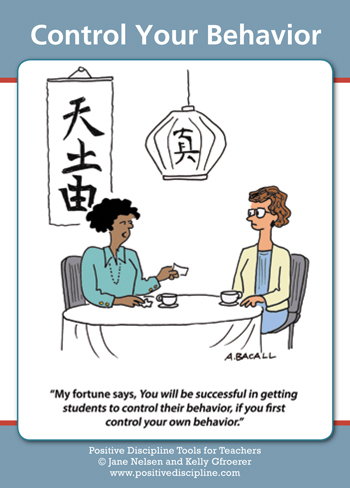Excerpt from Positive Discipline Tools for Teachers by Dr. Jane Nelsen and Dr. Kelly Gfroerer
Do you sometimes expect your students to control their behavior when you have not controlled your own? We don’t mean to instill guilt; rather, we want to create awareness. We often catch ourselves behaving in ways we aren’t proud of once we have taken time to calm down and assess our actions.
Teachers are not perfect, and neither are students. It is quite normal to react when challenged. We need all the tools we can learn to help us have more control over our behavior, and skills for apologizing to repair the mistakes when we don’t. As we have said many times, students are wonderfully forgiving when we take time to genuinely apologize.
It has been said that if you know better, you do better. This is not necessarily true. Sometimes we know better and still get caught up in reaction and forget everything we know in the moment. When we do calm down, we are often far too critical of ourselves. Review the Mistakes as Opportunities for Learning tool and the Four R’s of Recovery from Mistakes. Use them, and teach your students to use them.
The goal is improvement, not perfection. Thus it is okay to teach something you haven’t mastered yourself (such as perfect control), so you can also model using mistakes as opportunities for learning. It is okay to let your students know you are taking a time-out for yourself when you need to calm down. Remove yourself from the situation and get centered before attempting to solve a problem. If you can’t leave the scene, count to ten or take deep breaths. When you calm down, apologize. By apologizing, you create a connection and a feeling of closeness and trust in your classroom. In this atmosphere you can work together for solutions. When you model this openness to learning, your students will follow your model and be focused on solutions.

Positive Discipline Teacher Tool Cards (Also available as an App for iPhone and Android)

